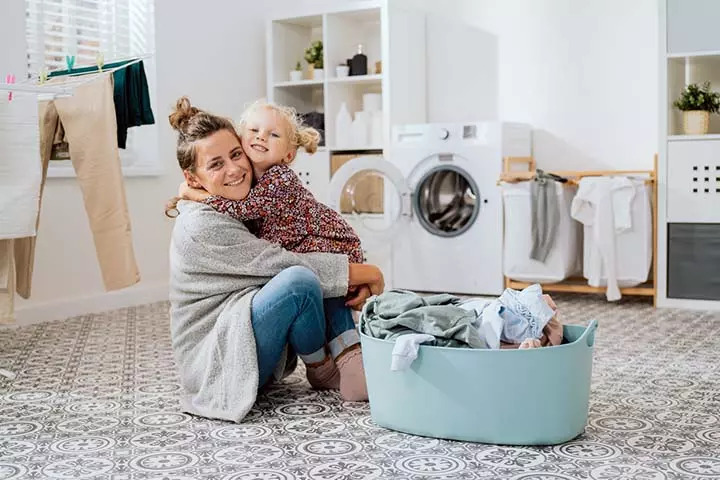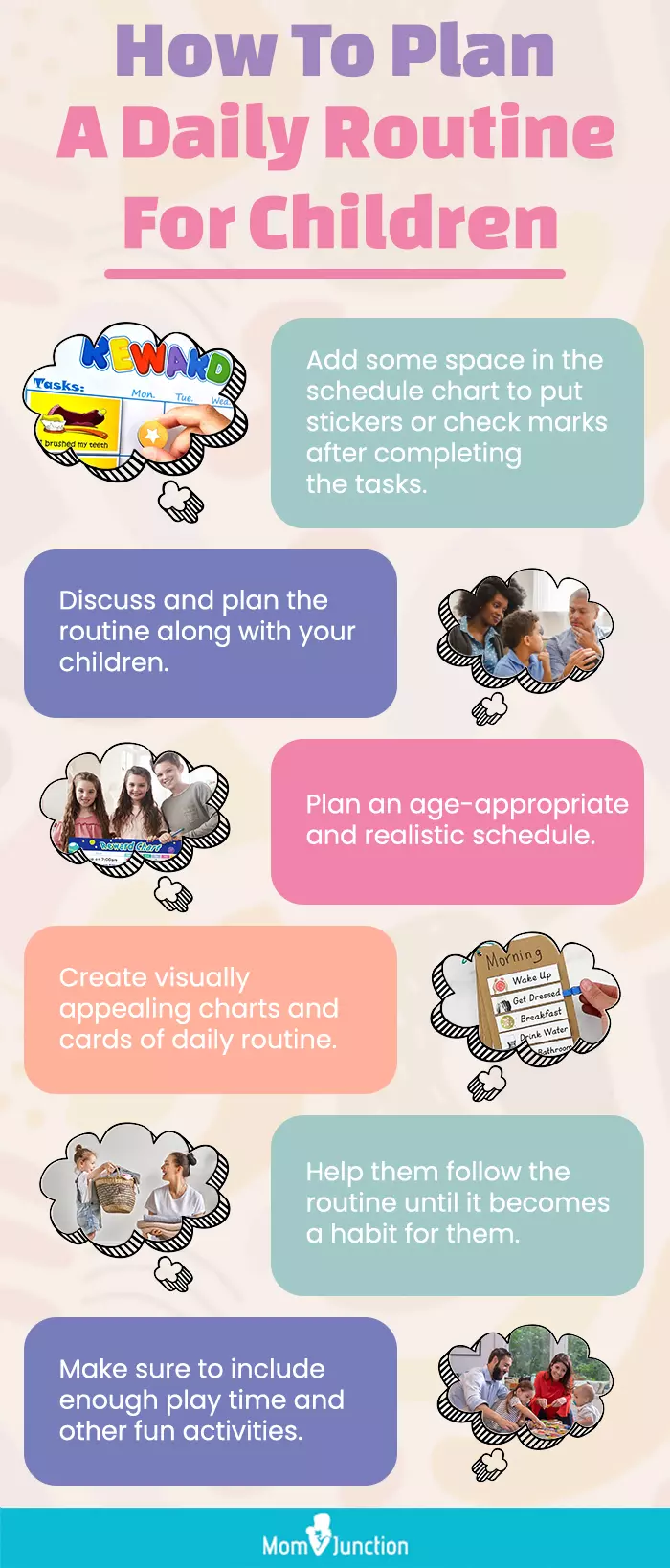
Image: Shutterstock
A daily routine is a set of planned activities that happen regularly throughout the day. Creating a daily routine for kids has several benefits, and the best way to do it is to maintain a schedule that works for both the kids and you. You should plan a routine that can help your children be productive, develop discipline, and build decision-making skills. It should also encourage good habits and invite peace to their minds and home. In this post, we expand on the benefits of a healthy routine for children and offer tips to implement it.
Key Pointers
- A routine instills accountability and is necessary for effective time management.
- Teach children to maintain a routine with the help of an illustrative chart.
- Include all the parts of the day in the routine.
- Plan the routine along with them and be flexible with their choices.
Importance Of Routine For Children
Establishing a daily routine for your children, from when they wake up to when they go to bed, is crucial to give them the confidence to perform daily tasks, develop life skills, and build healthy habits (1). Following a routine also helps them manage time and feel more independent. Besides, it also brings uniformity to their daily life (2).
 Did you know?
Did you know?Read on as we tell you why you should encourage your child to set a daily routine.
1. Helps children imbibe healthy habits

Establishing a set daily routine is a great way to teach your children the importance of healthy habits for children. Developing a habit takes practice and repetition, and often, you have to beg them to do their tasks. Thus, setting a routine encourages and guides them to complete tasks such as washing hands, brushing teeth, combing hair, doing homework, cleaning the room, and getting dressed and imbibe certain habits that will stay with them until adulthood.
2. Reduces parental exhaustion
When a family establishes a routine, life runs more smoothly, and the family gets more time to bond. Setting up a routine at home can help all members become more organized and lower your stress levels. It also allows children and parents to find free time to play, relax, or be creative.
Having fun or spending time together such as during lunch and dinner time promotes a sense of belonging and improves family relationships. A consistent routine will also help your child become more independent once they have developed a habit of following it with less supervision or help from their parents or elders.
3. Helps manage screen time

Using less social media and reducing screen time can give children more time to engage in outdoor games and get some physical activity. You can also try to encourage them to read books.
It is essential to teach time management to kids and limit their time they spend on social media platforms. Allot a set time for your child to spend on their phone as a part of their routine. For instance, you could allow them to do this after they complete a piece of schoolwork. This will teach your child the importance of taking the time away from their screens and value the time they have.
Mama Annissa, mother to Jakub and Amaya and a motherhood vlogger, shares how she effectively incorporates screen time into her son Jakub’s daily routine. Annissa says, “I give him screen time twice a day, and I tend to use it to my advantage. So first thing in the morning, I need to sit and feed Amaya, so that’s when he gets to watch blippi or sometimes nursery rhymes… Around quarter past or half past four, Jakub will get his second lot of screen time, and that usually means I can get into the kitchen and start making dinner (i).”
 Point to consider
Point to consider4. Makes children responsible
A set routine accustoms your children to know what they need to do. Whether it is a chore such as helping you with cooking or an activity, they would know their responsibilities, and they do not have to be reminded repeatedly. This also helps you instill a sense of independence in children.
5. Makes a child’s bedtime easy

It’s not easy to get your children to go to bed. Daily schedules and bedtime rituals such as storytelling play a huge role in helping them get good sleep and function at their best. Also, saying bedtime prayers for children is a gentle and comforting way to end the day. Sleepiness can affect your child’s ability to pay attention and perform day-to-day activities. A routine also helps set your child’s body clock, allowing your child’s body to know when it is time for bed. According to a study published in Sleep Medicine Reviews, “…the implementation of a consistent bedtime routine is beneficial for many aspects of sleep in early childhood, including sleep onset latency, sleep duration, and sleep quality and consolidation, and has benefits that are just as important for overall child development and wellbeing, including health, emotional–behavioral development, literacy, parent–child interactions, and family functioning, to name just a few (2).”
6. Makes learning easier
With intentional routines, children get more opportunities to improve their thinking and problem-solving skills. They can also develop their language skills and vocabulary. Moreover, they can learn higher-order thinking skills quite easily and develop independence and autonomy at a young age (3).
Amy, a mother of three, writes about how routines made her children independent. In her blog, she writes, “In our home we introduced a simple morning and evening routine by placing visual charts up in our daughters’ room. By giving them an easy reminder of the steps they could take on their own, we saw them bloom in independence…Now at 5 and 3, our two oldest girls are almost completely independent in their morning and evening routines (ii).”
Tips To Set A Daily Routine For Your Child
You could start establishing a routine from when your child is still a toddler. Here are a few tips for setting a daily routine for your child.
1. Involve your child in decision-making. Discuss with them and plan out a routine that works for you and them.

2. Some children may not like the idea of following a schedule. If your child is one of them, involve them in some fun learning activities during playtime. You may take them with you for gardening or swimming. These will enable them to learn important skills while having fun. You could also make handmade or printed routine charts that appeal to them.
3. Ensure the routine is realistic and fits your child’s age. Explain the routine to your child and ensure they understand what you want them to do and when. Also, assist them in their routine until they build a habit of doing it on their own.
4. Create visual routine charts or cards that will help remind your child of what to do. Place them at appropriate places or in every room so that they are noticeable to everyone at home. Encourage them to refer to the chart after each activity.
5. If your child is unable to complete a specific task within the schedule, break the process into smaller steps.
6. Have a method to indicate when each step has been completed by using a checkmark, sticker, etc.
7. Provide positive feedback or offer praise whenever they complete a task or show good behavior.

8. Ensure your child knows what to do at each part of the day. For example, they should brush their teeth, take a bath, get dressed, comb their hair, eat breakfast, etc., each morning. You can set up a schedule manually and put it up in their room or plan one with the help of technology such as apps or online timers.
 Quick tip
Quick tip9. Make sure the evening routine includes making the bed, packing bags, sorting out clothes, and arranging school uniforms to save time in the morning.
10. Be flexible with the routines during the weekends or school holidays. You could let them sleep in a bit later, spend a little more time with friends, have an extra snack, etc.
Chart For Daily Routine

Frequently Asked Questions
1. What is the best morning routine?
The best morning routine for kids includes getting up early, exercising, or doing yoga for a short period, and then beginning to get ready for school. Allow or encourage your children to do their morning rituals independently from an early age, such as using the washroom, brushing their teeth, bathing, wearing their uniforms, and eating breakfast.
2. How can I improve my kids’ daily routine?
If your daily routine for your children isn’t going as planned, try to figure out what’s causing the issues and fix them. For example, if waking up early is challenging, get yourself and your children to sleep early at night; if preparing breakfast is a hassle, decide on a breakfast menu for the entire week based on your kids’ preferences. Also, set study hours and screen time, and try to be with your children during study hours. The routine may be disrupted occasionally, but this should not be a continuing problem.
3. Should infants be put on routines as early as possible?
Infants can benefit from routines since it gives them a sense of predictability, security, and consistency. While infants’ sleep and feeding schedules are erratic in the first few months, as they become older, they tend to settle into more regular patterns. Infants can develop healthy eating and sleeping habits with mild routines. But it’s crucial to remember that every child is different, and their demands could change.
4. How can I set a routine for children of different ages?
The daily routine for children should be based on their age and developmental stage to prevent frustration and resistance. For instance, toddlers typically require more time for naps, meals, and playtime, while preschoolers could benefit from structured activities. On the other hand, older children will probably need a routine that includes time for schoolwork, extracurricular activities, chores, and independent play or reading.
Establishing a daily routine for kids enables them to stay organized, work independently, and complete their tasks on time. It also reduces your stress and provides you with more free time. Although some children dislike following a routine, you can encourage them by asking their opinion while making the routine, involving them in fun or recreation activities, and using visually attractive routine charts. Once children start following routines, they will understand their responsibilities better. Besides, you will feel less tired and get sufficient time to bond with your children and other family members.
Infographic: Quick Tips To Make A Daily Routine For Children
A good and established routine ensures a disciplined and organized way of living for children or adults. However, creating a daily routine for children is essential and can be challenging, too. Therefore, we have outlined some helpful tips in the infographic below to help you make a good and balanced daily routine for your children.

Illustration: Momjunction Design Team
Illustration: Easy & Simple Tips to Create A Daily Routine For Kids

Image: Stable Diffusion/MomJunction Design Team
Brace yourself and learn about the little moments of daily routines! Join us as we explore what kids do in a day and learn new vocabulary.
Personal Experience: Sources
MomJunction articles include first-hand experiences to provide you with better insights through real-life narratives. Here are the sources of personal accounts referenced in this article.
i. 2 year old daily routine │A day in the life of a two year old │Toddler routine;https://www.youtube.com/watch?feature=shared&v=-UppCY5kgo8
ii. PARENTING :: Morning + Night Routines;
https://houseofeilers.wordpress.com/2019/08/14/morningnightroutines
References
- Family routines: how and why they work.
https://raisingchildren.net.au/grown-ups/family-life/routines-rituals-relationships/family-routines - Jodi A Mindell and Ariel A Williamson; (2017); Benefits of a bedtime routine in young children: Sleep, development, and beyond.
https://pmc.ncbi.nlm.nih.gov/articles/PMC6587181/ - Routines: Extraordinary learning in everyday opportunities.
https://www.education.vic.gov.au/Documents/childhood/providers/edcare/Three-Year-Old-Kindergarten-Teaching-Toolkit/Tip-Sheet-9-Routines-V4.pdf
Community Experiences
Join the conversation and become a part of our nurturing community! Share your stories, experiences, and insights to connect with fellow parents.
Read full bio of Dr. Dur Afshar Agha
Read full bio of Soma Sengupta
Read full bio of Harshita Makvana
Read full bio of Kavita Kankani

















